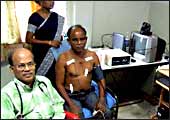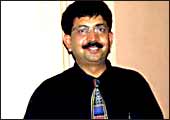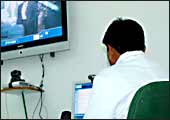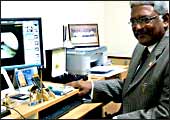 |
| All wired up: Dr S.P. Murugappan
with a telemedicine patient at his Tiruvallur hospital |
In
august 2005, when Dr Vikram Muralidharan was trying out the new
telemedicine facility at his 25-bed hospital in Annamalai in Tamil
Nadu, a bizarre case came up that would reinforce his decision
to go in for the new-fangled technology. A tribal, who had been
knocked about by an elephant, was wheeled into Dr Muralidharan's
hospital, with lacerated bones and eyes popping out of their sockets.
As luck would have it, Dr Muralidharan was
actually on a video conference with an orthopaedician in Chennai
and an ophthalmologist in Hyderabad. When he was informed of the
emergency case, Dr Muralidharan asked the other two doctors to
stay online for consulting. Fortunately, the tribal patient had
no serious internal injuries. So, with the help of the two specialists,
Dr Muralidharan put the tribal's eyes back into their sockets
and treated the lacerated bones as well. In just three days, the
tribal was back home (determined, perhaps, never to cross the
path of an elephant again).
Mauled by an elephant, saved by a mouse.
The nature of the patient and the nature of the technology used
to save the tribal's life drive home the promise of telemedicine
in a country like India, where medical infrastructure is scarce
and patients far flung. By allowing doctors-typically, specialists-to
consult even the poorest of poor patients remotely, telemedicine
can help not just spread healthcare to remote corners of the country,
but maximise utilisation of the existing healthcare resources.
A FICCI-Ernst & Young report on the sector says that telemedicine
is "potentially, the biggest success story in the healthcare
sector: telemedicine today has given ordinary doctors the capacity
to do extra-ordinary things".
Dr Muralidharan would agree. Although his
investment in telemedicine facility is, he says, relatively high
at Rs 1.80 lakh and yet to break even, the doctor is happy with
the results. He is able to tap online specialists at Madras Medical
Mission or kg Hospital in Coimbatore, or expert diabetologists
at MV Diabetes Centre for a second opinion. He is learning new
treatment regimens every day (thanks to, instructions from super-specialists
on patient treatment) and enhancing his own knowledge.
 |
| Bhardwaj's Space Hospitals
plans to introduce mobile vans with V-Sat facilities to take
telemedicine to remote areas |
More importantly, his patients are happy.
For a consulting fee of Rs 450, they are able to get a prescription
from a super-specialist with whom they can speak online. "Without
telemedicine, I would have lost my patient to a city doctor-he
would never have come back to me,'' says Dr Muralidharan.
For patients, at least in small towns and
villages, it's a terrific deal, too. They need not spend money
commuting to a city hospital, waste time in the doctor's waiting
room, or undergo a lot of routine tests. The same rigmarole can
be avoided in cases where follow-up visits are required. Says
Dr S.P. Murugappan, who runs a 20-bed hospital in Tiruvallur,
45 km from Chennai: "Earlier, trauma cases used to head straight
to Ramachandra Medical College (25 km from Tiruvallur), but now
my hospital has become the first destination."
Dr Murugappan speaks of a patient who came
in with a heart attack on New Year's eve recently, and how telemedicine
saved his life. After stabilising his condition, the doctor patched
through virtually to a super-specialist at the Madras Medical
Mission (MMM) who could monitor the patient's condition remotely.
After a couple of days, the patient was transported
to MMM, where an angiogram was performed, followed by a bypass
surgery. And within a week of his admission to Murugappan's Surya
Hospital, the patient was back home in Tiruvallur. "A lot
of red tape relating to admission was bypassed because the specialist
was already familiar with the condition of the patient even before
he arrived,'' says Dr Murugappan.
Not Just New Technology
 |
| Yes, I can hear you: Neemrana
in Alwar gets its first telemedicine center |
 |
Telemedicine is not new, and some of the bigger
hospitals such as Apollo Hospitals, Manipal Hospital Group and
Wockhardt Hospitals have been using it for some years now. But,
typically, they use it within their own hospitals and for their
own patients. Helping connect the larger, tertiary hospitals with
the smaller, secondary hospitals is a Chennai-based firm called
Space Hospitals. Despite its name, Space Hospitals is not a hospital
but a third-party service provider. The smaller hospital is required
to invest in equipment such as a personal computer, scanner, web
cam and a black box (for measuring blood pressure, ECG and the
level of oxygen in blood) that is then connected to Space Hospitals'
network. Often, there is a separate telemedicine room with a bed
for the patient.
At present, Space Hospitals has 16 major
hospitals in its network (including Asian Heart Institute in Mumbai,
and Rajiv Gandhi Cancer Institute in Delhi) and dozens of smaller
ones (like Samatha Nursing Home in Nellore, Andhra Pradesh, and
Apna Hospital on nh-21 Ghagas-Bilaspur, Himachal Pradesh). Sanjay
Bhardwaj, President & CEO, Space Hospitals, expects the network
to grow rapidly in the years ahead. He explains why. According
to him, only 10 per cent of India's total doctors (5.92 lakh)
are specialists. Worse, almost all of them are in the metros.
"Out of every 10 patients who consult with a super-specialist,
only six really need his validation. The other four can be served
by a general physician in their own towns," says Bhardwaj.
In Space Hospitals' brief 12-month history, only eight of the
1,800 telemedicine consultations had to be moved on to bigger
hospitals after two weeks of monitoring. "Just imagine how
much time, money, and energy was saved for patients," he
says. Adds Dr Muralidharan: "This is the basic ethos of the
concept that we are selling.''
In March this year, Space Hospitals plans
to introduce its own mobile vans with v-sat facilities. These
vans will serve as Space Hospitals hubs for tele-consultations,
and go around villages and, much like a medical camp, identify
patients and initially give them free treatment and also free
medicines, which would be procured from the city and couriered
where necessary. The idea is to popularise telemedicine among
villagers.
With the government planning to build an
internet kiosk at every panchayat in the country, telemedicine
may find its feet in rural India much faster than most people
expect. Under the model that Space Hospitals has in mind, the
kiosk operator would offer the black box facilities, and a local
doctor would issue a prescription based on the recommendations
of a small-town hospital doctor or even a super specialist, if
need be. Some private equity investors, including an NRI investor
from Singapore who does not want to be named, have already put
in seed money behind Space Hospitals. But Bhardwaj says bigger
venture capitalists have expressed interest in greater investments.
 |
| Dr Raghupathy's G. Kuppuswamy
Naidu Memorial Hospital has implemented Asia's largest PACS
facility and has a digital storage capacity of 3 terabytes,
or 3,000 giga bytes |
Another area where patients, poor and rich,
are going to be seeing a lot of progress is digitisation of medical
records. G. Kuppuswamy Naidu Memorial Hospital, a charitable 600-bed
hospital in Coimbatore run by the Lakshmi Mills Group, has implemented
Asia's largest PACs (Picture Archiving Communication Services)
facility. PACs is nothing but digitisation of diagnostic records
the minute a test is completed, so that doctors can access it
off a central server anytime and anywhere within the hospital.
"We are not counting immediate benefits in our investment
in technology, but in the long term, several benefits would definitely
accrue," says Dr Ramkumar Raghupathy, Dean of the hospital,
which has a digital storage capacity of 3 terabytes (that's 3000
GB).
There are other hospitals such as Vallabhai
Patel Chest Hospital in Delhi (it was the first to implement PACs
in India), the Asian Institute of Gastroenterology, and Wockhardt
Heart Hospital that are using PACs. Larger hospital systems such
as Apollo are also maintaining electronic medical records. Apollo,
for instance, has scanned 10 lakh records. Wockhardt allows round-the-clock
remote monitoring of patients by specialists. Its ambulances have
the capability to transfer key patient data en route to hospital
so that treatment can be planned without loss of time.
Clearly, information technology is going
to dramatically change the way healthcare is delivered to millions
of people in the country.
|









